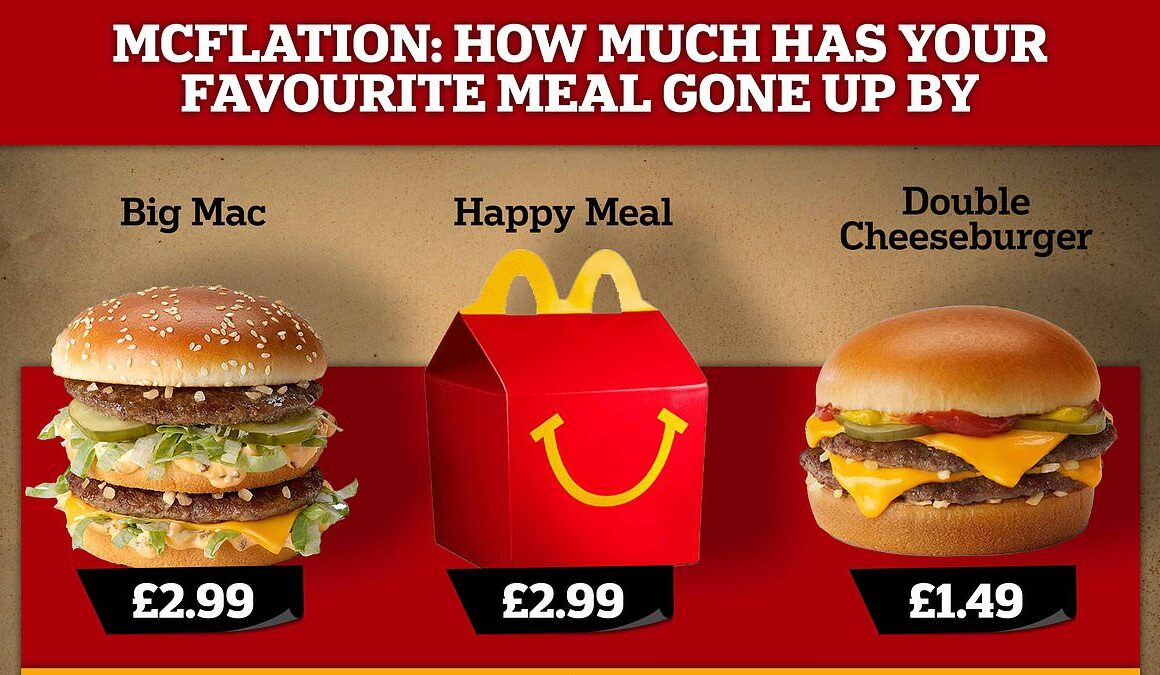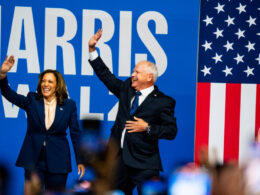The prices of a McDonald’s Big Mac, Happy Meal and double cheeseburger have all soared since the pandemic, as MailOnline reveals how much the staples cost now.
The popular fast food chain has suffered the first decline in sales since the end of 2020, when stores were closed during lockdown.
This may be due to the inflated prices which have hit many family favourites since Covid, with many customers shunning McDonald’s as a result.
Many customers who have loyally visited the fast food restaurant for years for its famously cheap food are now looking elsewhere.
The price of a Big Mac surged from £2.99 to £4.69 since 2020, while a Happy Meal now costs £3.59 compared to £2.99 the same year.

A graphic shows the price rise of McDonald’s Big Mac, Happy Meal and double cheeseburger

The price of a Big Mac surged from £2.99 to £4.69 since 2020

Chris Kempczinski, the chief executive of McDonald’s,said consumers are ‘more discriminating’ with their spending due to the cost of living crisis
However, the price of a Happy Meal is currently just £1.99 as part of a limited-time deal.
And according to The Telegraph, the chain has now reported a 1pc fall in global sales in the three months to the end of June.
Chris Kempczinski, the chief executive of McDonald’s, told The Telegraph consumers are ‘more discriminating’ with their spending due to the cost of living crisis.
McDonald’s bosses have previously flagged that customers seemed to be seeking better value for lower prices.
They also pointed to the success of the loyalty programme. This offers points to regular customers that can be redeemed to get money off future orders.
Loyalty members accounted for nearly $7billion (about £1.4 billion) in digital sales across 50 markets– up from $6billion in the previous three months.
The drop came despite offering money off deals to try to win back customers and those who have boycotted McDonalds over the Israel-Gaza war.

A Happy Meal now costs £3.59 compared to £2.99 in 2020

McDonald’s bosses flagged that customers seemed to be seeking better value for lower prices
However, the price surges seem to have made up for the fall in customers, with the chain reporting overall revenues of just under $6.5billion.
McDonald’s results dovetail with comments last week from Coca-Cola CEO James Quincey, who said sales were slow in restaurants – an indication of fewer people eating out.
The chain also reported lower store traffic in China, France and the Middle East, where people have been boycotting McDonald’s because of a perception that it supports Israel in the war in Gaza – which has been slammed as ‘misinformation’ by bosses.
CEO Chris Kempczinski said there is a lot more deal-thinking from consumers who have become ‘very discriminating’.
‘Consumer sentiment in most of our major markets remains low,’ he said.
In America, meaning sales were down by nearly one per cent.
‘The biggest hit for McDonald’s is the low-income consumer has really cut back on visits and that is more than offsetting the typical trade down [the chain] normally sees in tougher economic times,’ said Edward Jones analyst Brian Yarbrough.
The burger giant introduced a $5 meal deal at US restaurants – either a McChicken or McDouble, four-piece chicken nuggets, fries and a drink – on June 25. That offer was only live for about a week of the financial reporting period – so its effects will be seen in the next quarter.
At first introduced for four weeks, the $5 deal has been extended through the rest of the summer at most of its restaurants.
McDonald’s president Joe Erlinger says it has boosted sales.
Generally, chains are reeling from falling customer numbers as Americans fed up with two years of price rises stay away – so are rolling out all these offers.
Burger King’s $5 Your Way Meal – offering four items like McDonald’s – was the first to hit restaurants in June.
Wendy’s has a $3 breakfast offer and also a four-item $5 meal similar to McDonald’s and BK’s.
Starbucks also made a surprise entry into the value war with a coffee and food breakfast combo from $5.
Quarterly revenue for McDonald’s was flat at $6.5 billion and just off the $6.6 billion that Wall Street was expecting, according to analysts polled by FactSet. Opening of new restaurants offset the slight fall in same-store sales.








